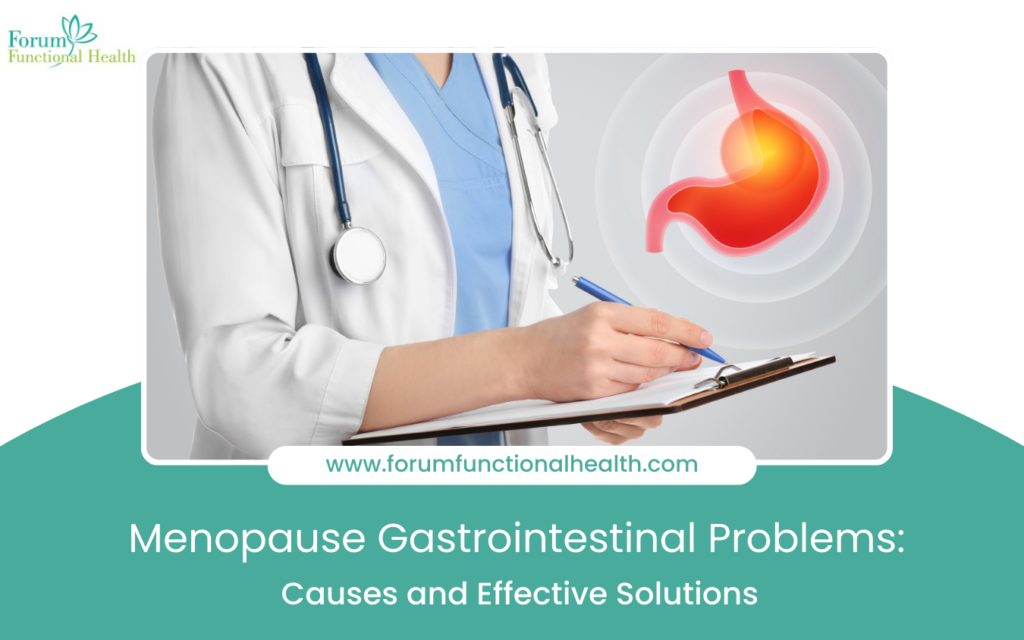Menopause Gastrointestinal Problems: Causes and Effective Solutions

Navigating the journey through menopause can be challenging, especially when unexpected symptoms like gastrointestinal (GI) problems arise. These issues can significantly impact daily life, from bloating and indigestion to severe abdominal discomfort. Understanding the causes and finding effective solutions can make this transition smoother for women.
Causes of Menopause Gastrointestinal Problems
Menopause gastrointestinal problems often stem from hormonal changes. During perimenopause and menopause, estrogen and progesterone levels fluctuate, impacting digestion and gut health. Here are some common causes:
- Hormonal Imbalance
A drop in estrogen can disrupt the balance of gut bacteria, leading to bloating, constipation, and gas. - Stress and Anxiety
The emotional toll of menopause often leads to stress, which can worsen GI issues like irritable bowel syndrome (IBS). - Dietary Changes
Cravings or a shift in dietary preferences during menopause can trigger stomach problems, including acid reflux or heartburn. - Slow Digestion
Hormonal shifts can slow down digestion, causing discomfort and irregular bowel movements. - Other Health Conditions
Conditions like thyroid imbalances, common during menopause, can exacerbate digestive issues. Consulting a functional medicine doctor in Thyroid Texas can help diagnose and treat these underlying causes.
Recognizing the Signs: Are Your Symptoms Related to Menopause?
It’s crucial to differentiate menopause-related GI problems from other medical conditions. Here are some signs to watch for:
- Persistent bloating or gas
- Frequent heartburn or acid reflux
- Abdominal cramps or discomfort
- Irregular bowel movements (constipation or diarrhea)
- Unexplained weight changes
If you are experiencing these symptoms, consider exploring premenopause, perimenopause, and menopause issues in Texas for personalized care.
Effective Solutions for Menopause Gastrointestinal Problems
Fortunately, several effective solutions can alleviate GI problems during menopause:
1. Adopt a Gut-Friendly Diet
- Focus on fiber-rich foods like whole grains, fruits, and vegetables.
- Avoid triggers like caffeine, alcohol, and spicy foods.
- Stay hydrated to support digestion.
2. Manage Stress Levels
To reduce stress, which can worsen GI symptoms, incorporate relaxation techniques like yoga, meditation, or deep breathing.
3. Consider Hormone Therapy
Hormone therapy can balance estrogen levels, improving both menopausal and gastrointestinal symptoms. Explore perimenopause hormone therapy for targeted relief.
4. Regular Exercise
Physical activity boosts digestion and reduces stress, helping manage GI problems effectively.
5. Seek Professional Help
If symptoms persist, consult a healthcare provider specializing in menopause, such as the Functional Health Center in Texas, for a comprehensive evaluation and treatment plan.
Emotional Impact of Menopause GI Problems
Experiencing menopause-related GI issues can be overwhelming. Feelings of frustration, isolation, and embarrassment are common. Remember, you’re not alone in this journey. Many women share similar challenges, and support is available through resources like the perimenopause stomach problems forum.
Moreover, hope lies in solutions tailored to your needs. Whether it’s understanding the 34 symptoms of perimenopause, addressing perimenopause fatigue, or finding the right perimenopause therapy McKinney, relief is achievable with the right approach.
When Perimenopause Ends: Signs to Look For
As perimenopause transitions to menopause, GI symptoms may begin to stabilize. Watch for the signs perimenopause is ending, such as:
- Fewer hot flashes
- More consistent menstrual cycles (or their complete cessation)
- Improved sleep patterns
However, even during menopause, maintaining a healthy lifestyle and seeking treatments like menopause treatment in Texas can ensure ongoing relief.
Success Stories: Finding Solutions
Many women have overcome GI issues during menopause with the right support. Some even find joy in unexpected moments—like those who say, I got pregnant during perimenopause, turning challenges into blessings.
Others achieve balance through expert care. The Functional Health Center in Texas offers personalized treatment plans for women navigating menopause and its related symptoms, ensuring holistic health.
Take Charge of Your Menopause Journey
Menopause and gastrointestinal problems don’t have to define this chapter of your life. By addressing the root causes, exploring treatments like perimenopause treatment in McKinney, TX, and seeking professional care, you can regain control and live vibrantly—contact Forum Functional Health Center in Texas.
Read More: Top PCOS Treatment Options for Women: From Medications to Lifestyle Changes
